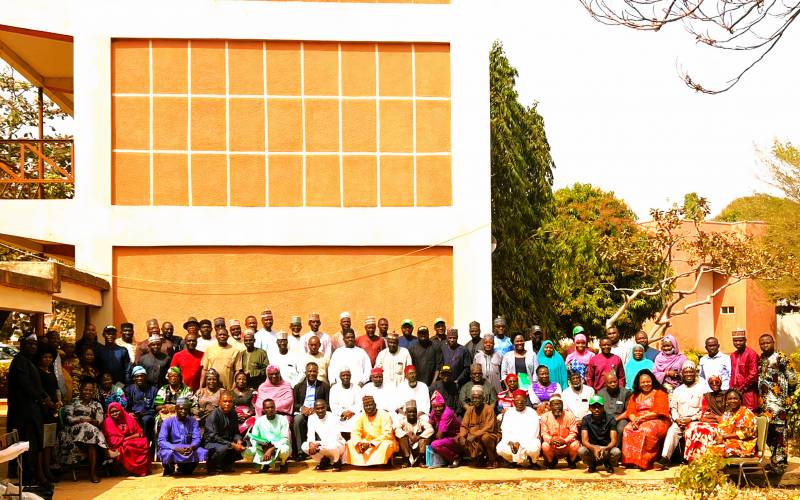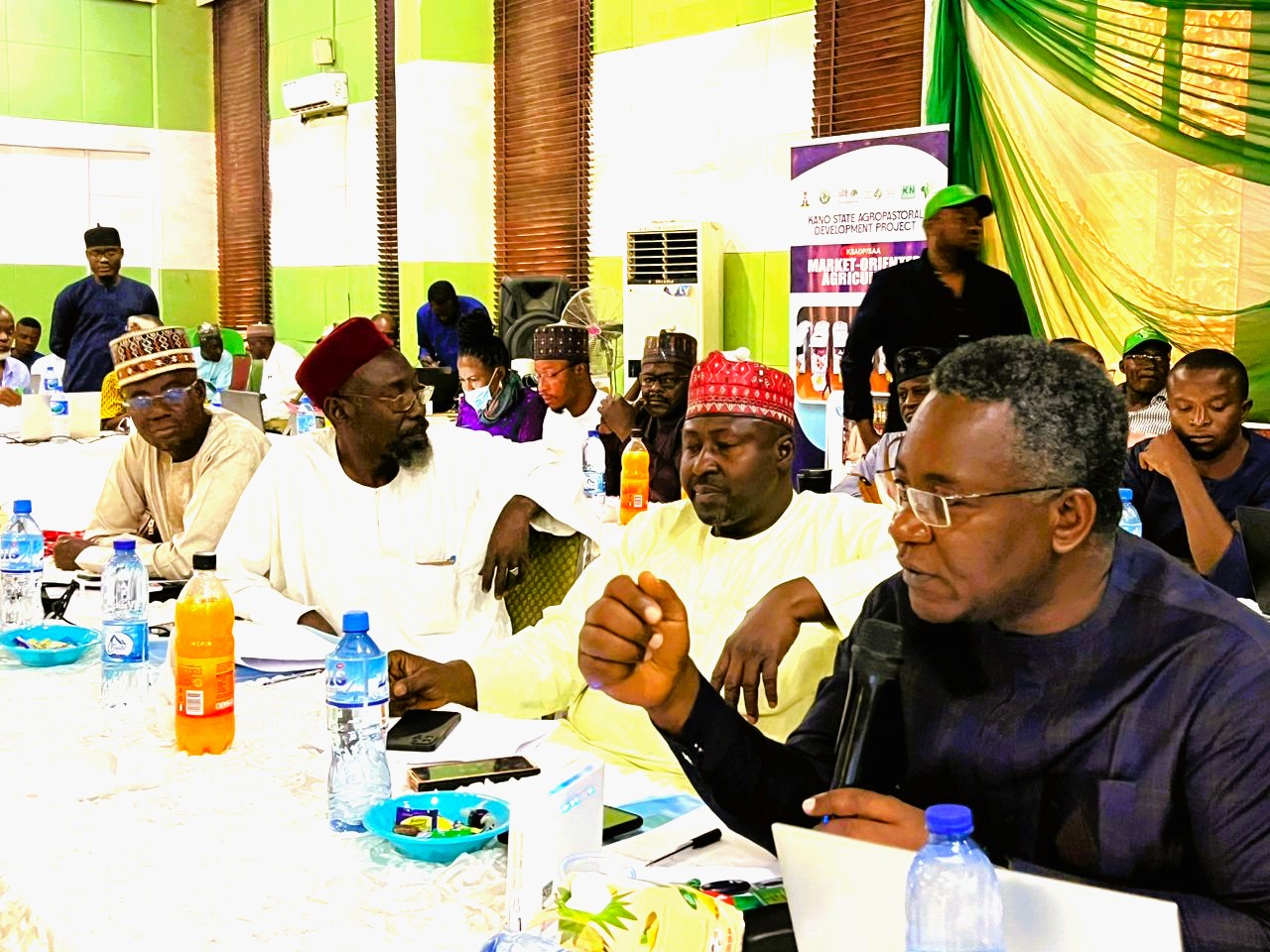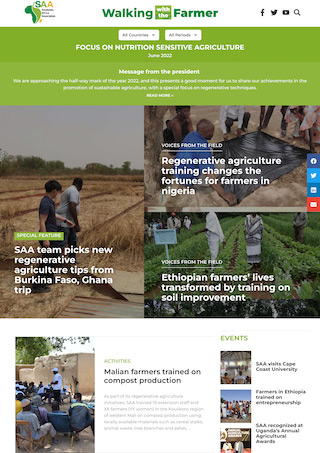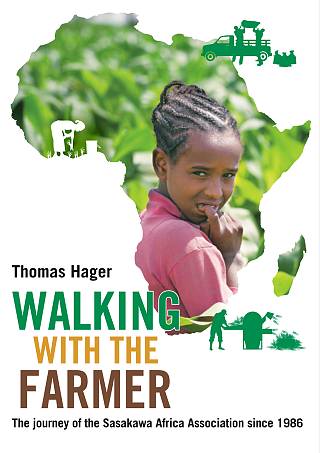SAA Nigeria organized Annual Stakeholders meeting: Calls for the Decarbonization of Cropping Systems to avert Food Crises

Decarbonization of cropping systems in Nigeria will bring several benefits including accelerating the productivity of crops, mitigating the impact of climate change, enhancing food security, averting food crises, and bettering the livelihoods, stakeholders have said.
At the 2024 Annual Stakeholder meeting held at National Agricultural Research Institutes (NAERLS) in Zaria, held on 20 February 2024, the President of Sasakawa Africa Association (SAA), Dr Makoto Kitanaka pledged SAA's unwavering commitment to advancing the decarbonization cropping systems)" across Africa through the promotion of climate-smart practices.
Decarbonization of cropping systems refers to the process of reducing carbon emissions associated with agricultural practices while simultaneously enhancing carbon sequestration in soils
Dr Kitanaka explained that climate-smart initiatives such as the use of "Bokashi and Biochar" were profitable in raising the productivity frontier of key crops as well as improving soil health, adding that SAA was promoting those technologies in Nasarawa state in Nigeria under a grant from the Japanese Ministry of Foreign Affairs (MOFA).
“The project is empowering rice farmers to build resilience and mitigate the impacts of climate change,” he explained. However, Dr. Kitanaka emphasized, "We recognize that without revitalizing the soil and enhancing agricultural productivity, decarbonization efforts are ineffective. This understanding is fundamental to SAA's strategy, which promotes regenerative agriculture for smallholder farmers. By prioritizing soil health and crop yields, we lay a crucial foundation for sustainable decarbonization, underscoring its importance for the livelihoods of smallholder farmers and the broader sustainability of African agriculture."
He also underscored the critical role of collaboration, stressing that "As we unite with the shared goal of advancing the agricultural sector amidst evolving global challenges, "collaborative efforts are crucial for achieving sustainable food security."
SAA Nigeria's Country Director, Dr Godwin Atser, further addressed participants and highlighted the challenges faced by Nigerian farmers, including low productivity, poverty, and the escalating impact of climate change.
 SAA-Nigeria CD, Dr Godwin Atser (Right), KNARDA MD, Dr Farouk Kurawa and Dean Faculty of Agriculture, ABU Zaria, Prof SB Abdu at the workshop.
SAA-Nigeria CD, Dr Godwin Atser (Right), KNARDA MD, Dr Farouk Kurawa and Dean Faculty of Agriculture, ABU Zaria, Prof SB Abdu at the workshop.He emphasized the need for interventions like the promotion/adoption of new seed varieties, the right use of chemical fertilizer, and strengthening linkages between farmers and quality inputs and markets.
The workshop delved into the crucial role of climate-smart agriculture in ensuring food security and tackling global challenges. Technical presentations were made on diverse topics like "COP 28 Goals and Objectives: Implications for Agriculture," "Unlocking Carbon Credit Opportunities for Smallholder Farmers," and "Regenerative Agriculture: Boosting Soil Health in Africa, etc." The event fostered knowledge exchange and showcased successful initiatives. Dr. Stella Kabiri, SAA Lead, regenerative agriculture, was among the esteemed speakers.
Representatives from diverse partner organizations actively participated in discussions and brainstorming sessions, focusing on capacity building, extension services, technology adoption, market access, and climate-smart agriculture practices. Collaboration emerged as a central theme, with stakeholders exhaustively discussing initiatives like facilitating access to solar irrigation and improving infrastructure, underscoring the importance of collective action in addressing these challenges.
The workshop's outcomes reflected SAA's ongoing commitment to empowering Nigerian farmers and promoting sustainable agricultural practices that benefit the environment and ensure food security for all. Key outcomes, outlined in a communique include:
- Unanimous approval of SAA's 2024 activities focused on regenerative, nutrition-sensitive, and market-oriented agriculture.
- Recognition of the critical need for decarbonized cropping systems to mitigate climate change impacts.
- Emphasis on exploring climate-resilient seed varieties, reducing chemical fertilizer use, and linking farmers to quality inputs and markets.
- Call to showcase successful initiatives like the Kano State Agricultural Development Project (KSADP) to encourage wider adoption in other states.
- Importance of engaging seed companies in sustainable seed dissemination planning and implementation.
- Underscoring knowledge sharing and experience exchange through various channels.
- Recognition of the link between food security and national security, with agriculture playing a vital role.
- Promoting income generation opportunities for farmers to ensure intervention sustainability.
- Exploring partnerships to provide access to affordable agricultural tools and equipment.
- Prioritizing safety measures for operators using machinery distributed by SAA projects.
- Advocating for climate-smart technologies and local mitigation measures, partnering with relevant organizations for climate projects.
- Engaging with meteorological agencies for effective information dissemination to farmers.
- Investigating the potential of carbon credits to support project funding and benefit farmers.
- Launching strategic advocacy with the government to attract private sector support for carbon credits.
- Mainstreaming short-term training courses through collaboration with universities.
This workshop marks a significant step forward in SAA's continuous efforts to empower smallholder farmers in Nigeria, address climate change challenges, and contribute to sustainable agricultural development in the country.
*** End
Moses Nongoatse
Communication Officer,
Sasakawa Africa Association Nigeria.
For more information
Contact: Communication Officer, Sasakawa Africa Association- Nigeria
Abuja Office: No 19 Ogbomosho Street, Garki Area 8, Abuja, Nigeria
Kano Office: No.8 Kura Road, Off Magajin Rumfa Road, Nassarawa GRA PO Box 5190, Kano, Nigeria. Email: mnongoatse@saa-safe.org +234-806-65763542
Online news media: Premium Times
The Sun Nigeria
SAA Publications

E-newsletter
"Walking with the Farmer"
SAA publishes a bimonthly e-newsletter reporting on SAA activities.

SAA history book
"Walking with the Farmer: The journey of the Sasakawa Africa Assoication since 1986"
This book chronicles the history of SAA from its inception to the present.

Success stories
Voices from the Field Special Edition 2022
This is a special edition of the "Voices from the Field" articles.




